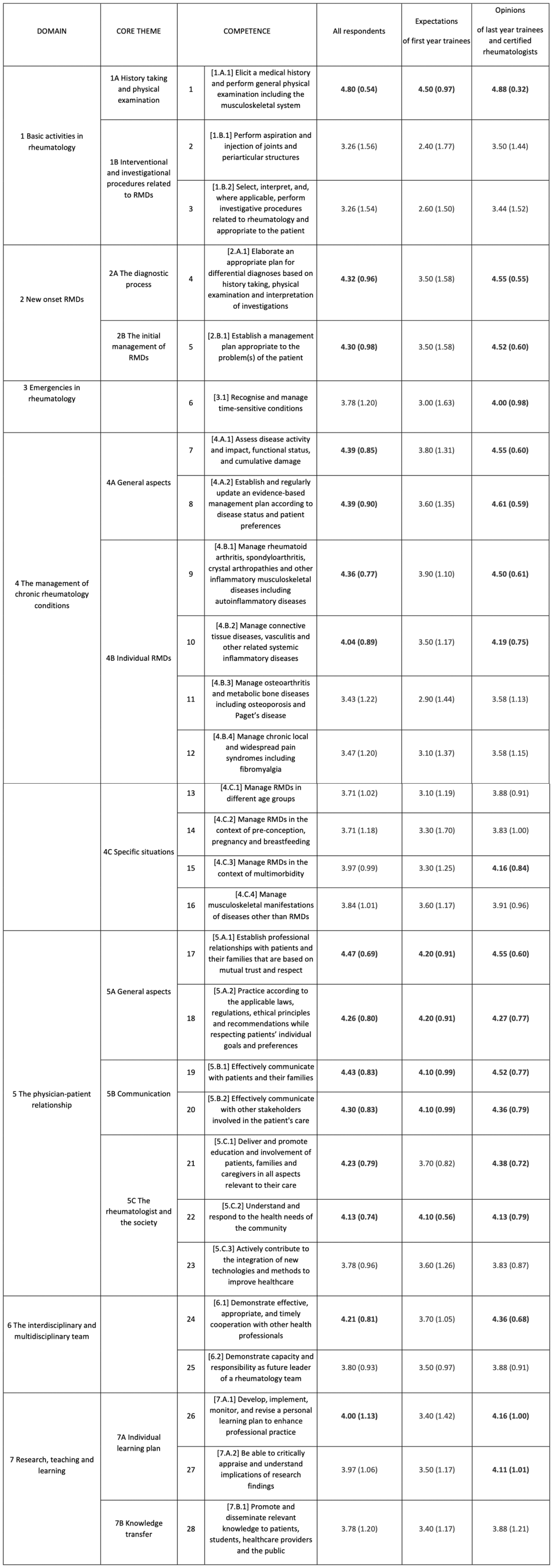

Background: In 2023, the EULAR-UEMS standards for the training of European rheumatologists have been published encompassing 28 competences within 7 domains that should be achieved by the end of postgraduate rheumatology training (Table 1) [1].
Objectives: To evaluate the expectations and viewpoints of rheumatology trainees and newly certified rheumatologists regarding the alignment of their training with the competencies outlined in the EULAR-UEMS standards for training
Methods: In December 2023, a survey was developed in English language and distributed through the network of the EULAR EMEUNET Committee. For each of the 28 competences, respondents were asked to report on a 0-5 Likert scale (0=unable to do; 5=fully able to do) the expectation of achievement by the end of training (first year trainee) or a self-assessment of achievement (last year trainees/recently certified rheumatologists). Descriptive results (the mean for each competence±SD) are shown.
Results: 27 trainees (12 first year and 15 last year trainees) and 26 certified rheumatologists from 17 Countries completed the survey. Respondents were mainly women (68%) aged between 26-35 years (78%). Trainees in the first year have high expectations of completing competences in the following domains (scored ≥4): “basic activity in rheumatology” (particularly, in the core theme “history taking and physical examination”) and in almost all “physician-patients relationship” related competences. Last year trainees and certified rheumatologists were more confident in all the domains, showing higher scores than the group of trainees (Table 1). Respondents were less confident (average score <3.5) in specific tasks such as performing interventional and investigational procedures and managing conditions such as osteoarthritis, metabolic bone conditions and chronic pain syndromes. In total, 20% of respondents reported that their training programs do not include these competences or those in the field of pregnancy. Seemingly current training programs also lacked training in the following competences: “understand and respond to the health needs of the community”, “demonstrate capacity and responsibility as future leader of a rheumatology team” and those in the core theme of “research, teaching and learning” (competence 26 and 28). On the other hand, the training programs seemed satisfactory in training residents for the domain of “new onset RMDs” since respondents declared that their programs allowed them to achieve the related competences in 100% of cases.
Conclusion: The evaluation of training in the 28 competences among rheumatology trainees resulted in mostly satisfactory responses, especially in clinical domains. The self-assessment of certified rheumatologists and of last year trainees was overall higher than the expectations of first year trainees. However, some knowledge/skill gaps were reported in training programs and the EULAR educational offer could help with filling these gaps.
REFERENCES: [1] Alunno A et al, Ann Rheum Dis 2023.
Table 1. Mean value (± standard deviation) calculated for each competence. In bold, mean scores ≥4. The specific question of the questionnaire reported: “By the end of your training, how would you judge your ability to perform the following competences on a 0-5 scale (where 0 means “Unable to do” and 5 means “Fully able to do independently”)”?

Acknowledgements: NIL.
Disclosure of Interests: None declared.